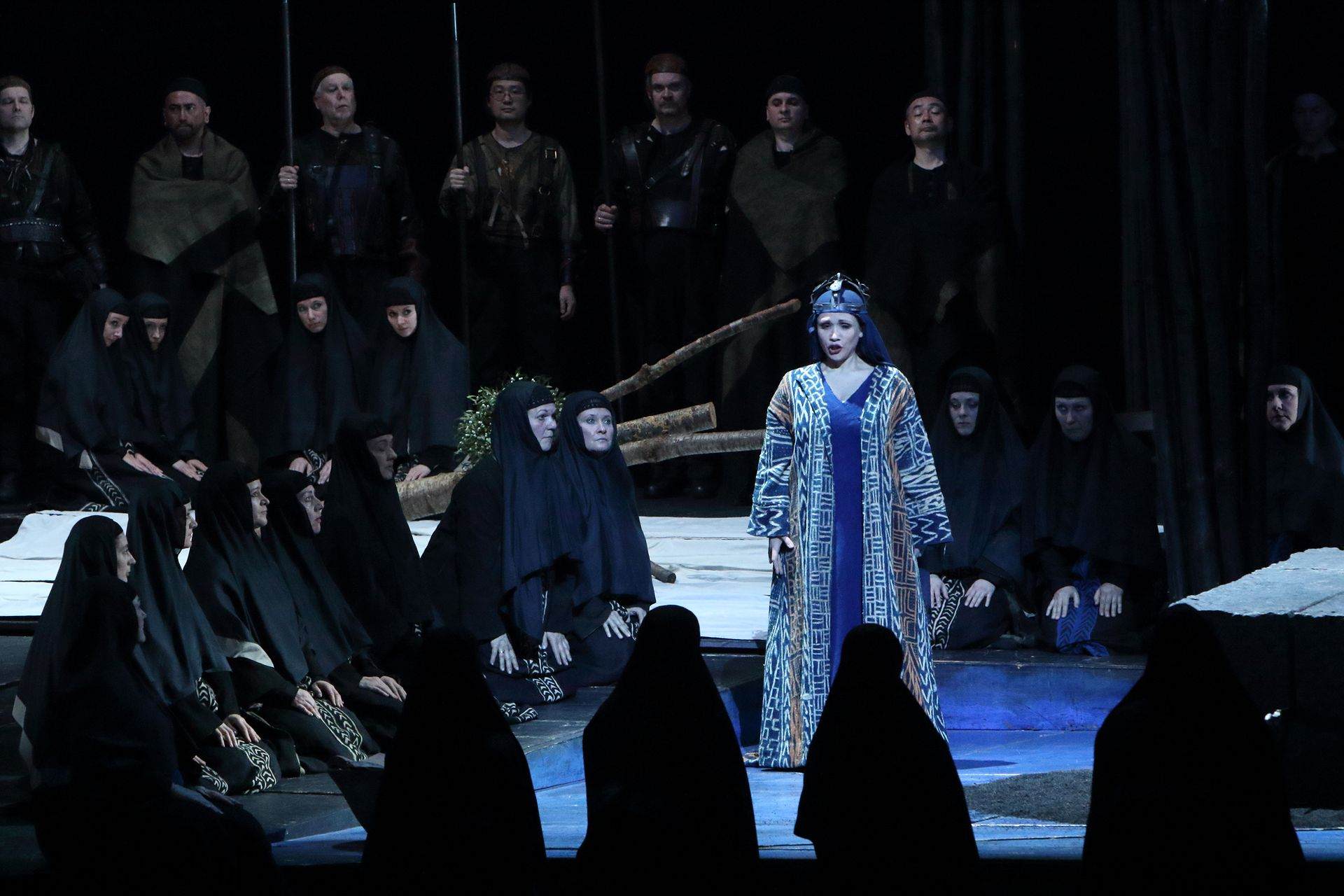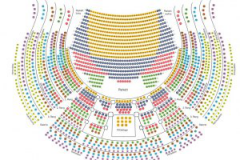Norma
Mo | Tu | We | Th | Fr | Sa | Su |
Act One
Oroveso, the archdruid, and the Gauls are again waiting in the sacred grove of the god Irminsul for Norma to announce to them the will of the god and finally give them the sign to rouse the people to rise against the Romans.
Pollione and Flavio approach the sacred grove on their regular patrol, and Pollione confides to his friend that he no longer loves Norma and that he has fallen in love with a young novice, Adalgisa. The druids assembled in the sacred grove demand that the strangers should no longer disturb the silence of the sacred place.
Norma appears and informs the impatient assembly that it is not yet the will of the god that Gaul should go to war. She performs the holy rites and prays to the moon goddess for peace, a peace for which she herself, torn between duty and love, yearns. She again urges the Gauls to be patient until she announces the decision of the god and herself calls them to arms, something which she keeps putting off because it would mean the end of her relationship with Pollione.
After the ceremony is over Adalgisa enters the sacred grove and kneels at the altar to beg the god to help her in her hour of need as she, too, has fallen in love with the Roman pro-consul.
He surprises her at her prayers and begs her passionately to fly with him to Rome. After some hesitation she succumbs to his entreaties and her feelings for him and promises to go with him.
Norma is in her own dwelling with her children. Clotilde, her only confidante, who knows about the closely kept secret of her affair with Pollione and also looks after their children, is with her. Norma has learned that Pollione is to be ordered back to Rome. She senses that there is a shadow over their love and is no longer sure that Pollione will take her and their children with him. She just manages to get Clotilde to hide them when Adalgisa comes in. The young novice has come to unburden her heart to her superior. She describes with great feeling how she has been approached for the first time by a man, how she has fallen in love with him and confesses that she is determined to break her vow as a priestess and leave her home. Deeply moved, Norma remembers her own unfaithfulness to her vows and how she has experienced what Adalgisa is describing. Seeing in Adalgisa a reflection of herself, she is prepared to free her from her vows – the young woman should find happiness and not suffer the same fate she
has suffered.
When she learns that Adalgisa’s lover is Pollione, her love for him turns into bitter hatred. In her moment of great despair she is called to the ceremony in the temple by the sacred gong.
What will the god tell her now?
Act Two
Norma is determined to kill herself and the children. Her feelings are in a turmoil; on the one hand she wants to protect the children from punishment or shame, on the other she wants to blot out everything to do with Pollione and hurt him deeply with the death of his children. A mother’s love, however, triumphs over despair and unrequited love. She summons Adalgisa, confides in her about the double life she has been leading and entrusts the children to her care. She is to take them with her when she goes to Rome with Pollione and be a mother to them. Adalgisa, however, decides to go to Pollione and remind him of his duty to return to Norma. The two unhappy women are united in friendship against the man whom they both love and who has caused them both such endless suffering.
The Gauls are still waiting for the sign allowing them to rise against the Romans. They have heard that Pollione is to return to Rome. Oroveso tells them he has heard that his successor will be even harsher. But the god has not yet given the sign for battle and so Oroveso again urges the Gauls to be patient so that the Romans will be lulled into a feeling false security.
Trusting absolutely in Adalgisa’s friendship, Norma waits for Pollione to return. But Clotilde informs her that Pollione is not prepared to give up Adalgisa, on the contrary, he is determined to use force to carry her off from the altar of the god.
Now the god Irminsul has spoken to Norma; she herself strikes the sacred gong three times and proclaims to Oroveso and the Gauls that the hour of battle and bloodshed has come.
First, however, a sacrifice must be made to the god. Norma finds herself in the difficult position of having to name the sacrificial victim. At that moment Clotilde rushes in and tells her that a Roman has broken into the sacred area of the novices. Pollione is dragged in. Oroveso demands that Norma should kill him, but she seeks a reason for delay and insists that she be allowed to speak to the prisoner alone.
In a last, desperate attempt to get Pollione to change his mind, Norma promises to let him live if he will give up Adalgisa forever. When he refuses she even threatens to kill their two children and when even that makes no impression on him she is beside herself with anger. She swears that she will not only destroy all the Romans but that Adalgisa should also pay the penalty and die at the stake.
When Pollione tries to kill himself, Norma summons the Gauls to return. She announces that a perjured priestess, who has broken her vows, is to be sacrificed. Conscious of her own guilt, when asked to name the wrong-doer she utters her own name instead of Adalgisa’s. She confesses her love for Pollione, which for her cannot die even in death. Too late, Pollione realizes her greatness and his guilt and begs for forgiveness.
Norma’s last thoughts are now no longer for Pollione but her children, whom she entrusts to her father’s care. Although initially horrified at what he has heard, Oroveso is moved by her pleas and promises to fulfill her wish, whereas the Gauls remain pitiless and curse Norma even as she walks to her death
Program and cast
Conductor - Gianluca Capuano
Production - Jürgen Rose
Choreography - Jo Siska
Lighting - Michael Bauer
Dramaturgy - Peter Heilker
Choruses - Franz Obermair
Pollione - Joseph Calleja
Flavio - Granit Musliu
Oroveso - Roberto Tagliavini
Norma - Sonya Yoncheva
Adalgisa - Tara Erraught
Clotilde - Emily Sierra
Composer Vincenzo Bellini. Libretto by Felice Romani.
Tragedia lirica in two acts (1831)
Duration est. 3 hours 15 minutes
1. Akt - est. 07:00 pm - 08:35 pm
Interval - est. 08:35 pm - 09:05 pm
2. Akt - est. 09:05 pm - 10:15 pm
recommended for 14 years and older
In Italian. With German and English surtitles.
National Theatre Munich
The National Theatre Munich (German: Nationaltheater München) is an opera house in Max-Joseph-Platz in Munich, Germany. It is the home of the Bavarian State Opera and the Bayerisches Staatsballett(Bavarian State Ballet).
The Bavarian State Opera also performs in the Prinzregententheater, which opened in 1901 and, like the Bayreuth Festspielhaus, is built to Richard Wagner's specifications, and in the Cuvilliés Theatre at the Residenz, constructed in 1751–1753 and described by Thierry Beauvert as "a Rococo gem".
The Nationaltheater is very easy to get to both by car and by MVV public transportation.
By MVV public transportation
S-Bahn: S 1 - 8 Marienplatz
U-Bahn: U 3, 6 Marienplatz, U 3 - 6 Odeonsplatz
Bus: 52, 131 Marienplatz, 100 Odeonsplatz
Straßenbahn: 19 Nationaltheater
On the day of the performance, holders of regular tickets are entitled to use public transport provided by the Münchner Verkehrsverbund (MVV). This service starts at 3 pm respectively three hours before the performance commences and ends with the closing hour of the MVV.
By Car
Take the Altstadt-Ring to Maximilianstraße.
Parking garage Max-Joseph-Platz: open Monday to Sunday from 6:00 A.M. to 2:00 A.M.
You can take advantage of the special theatre parking fee of Euro 10,- from 6:00 P.M. to 8:00 A.M. by presenting your admission tickets.

 EN
EN DE
DE IT
IT FR
FR ES
ES RU
RU JP
JP RO
RO
 Seating plan
Seating plan 
